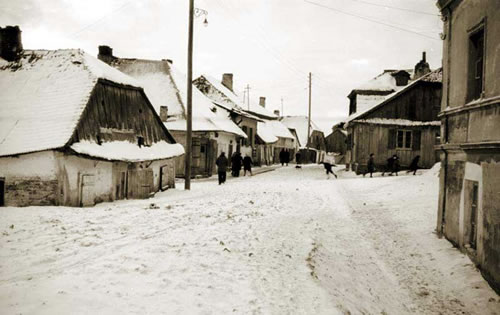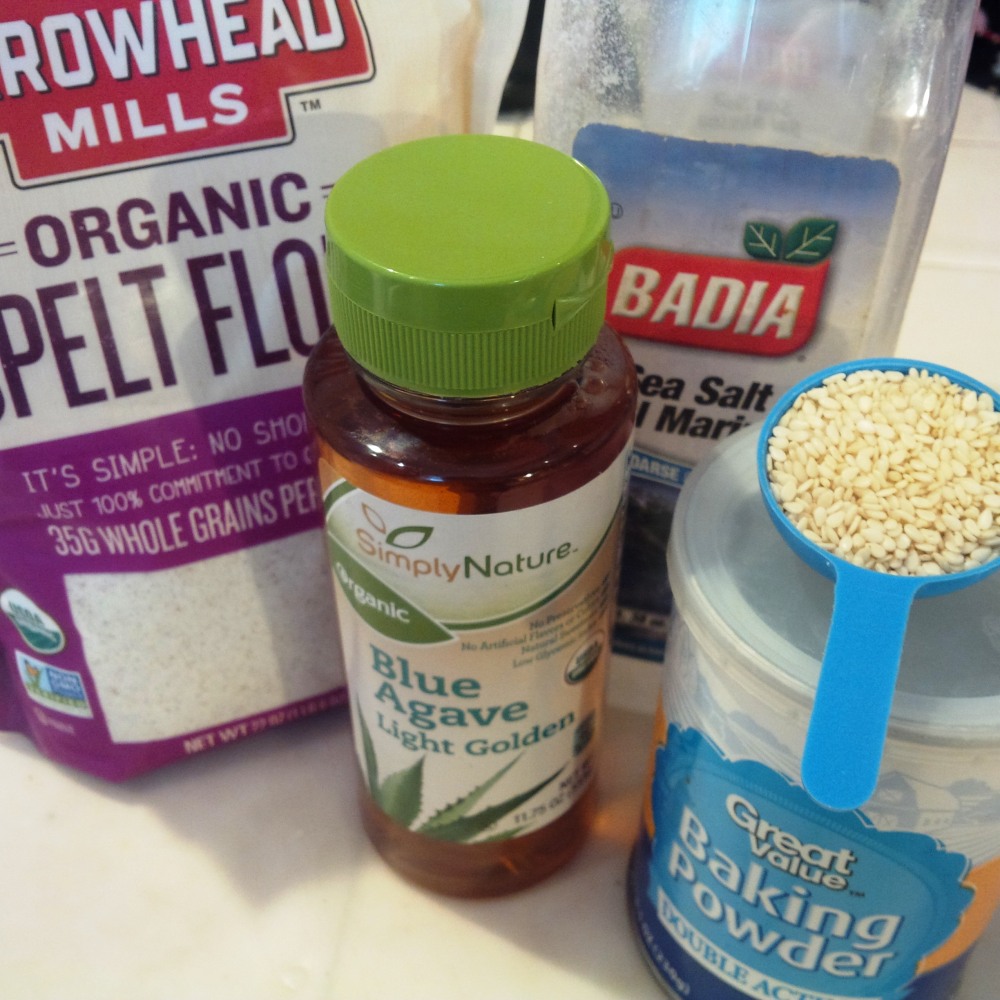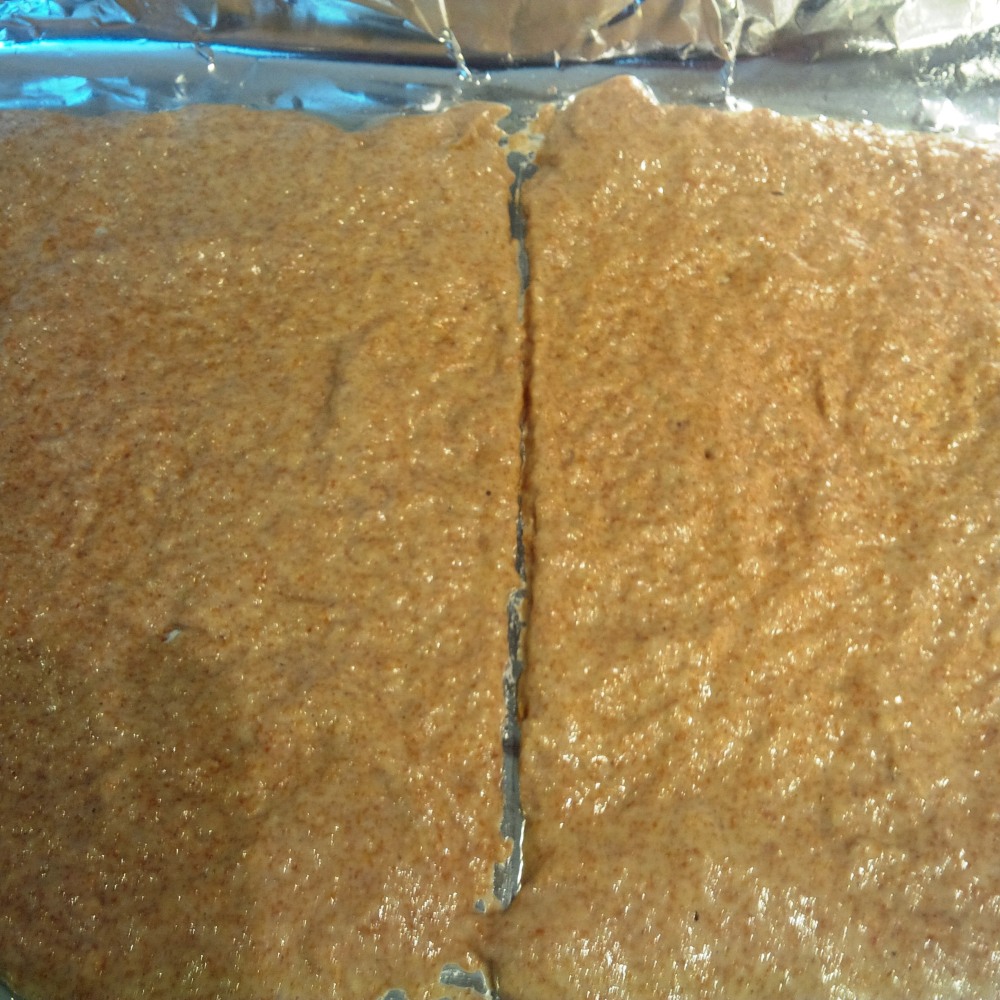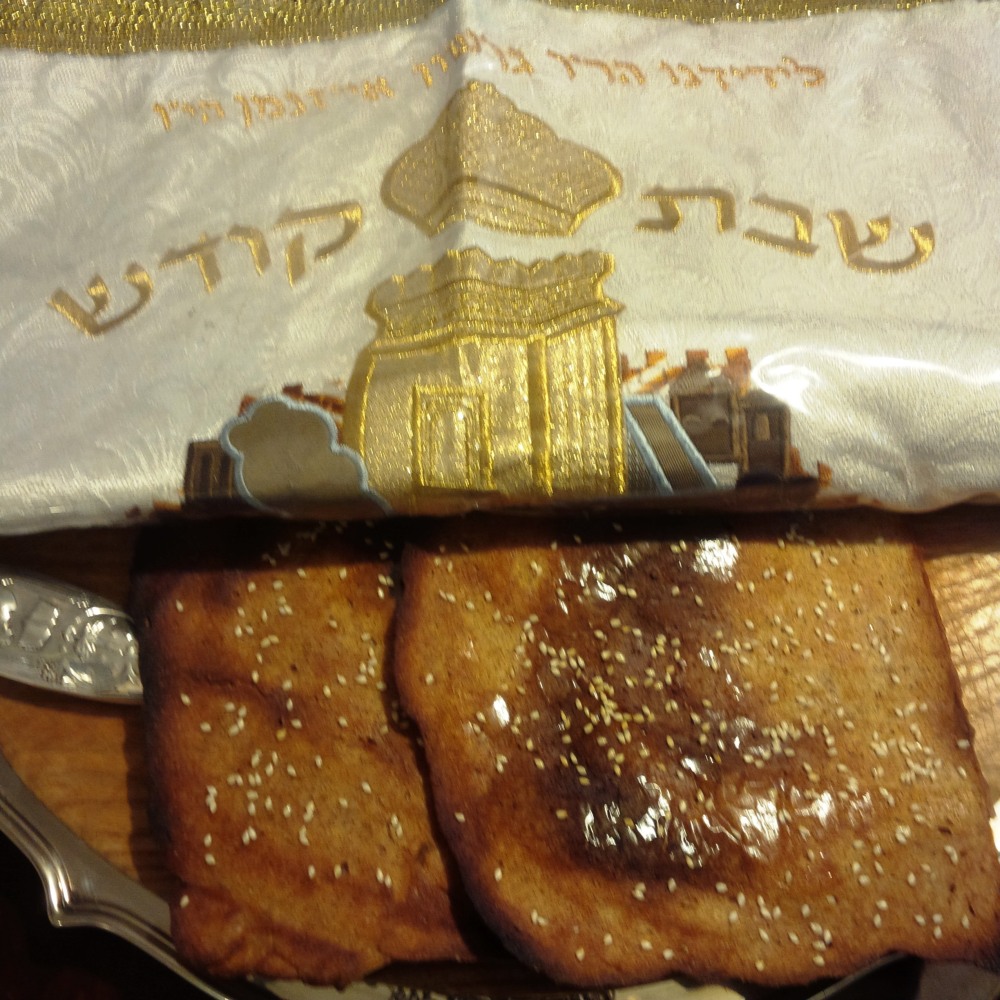We do not cook on Shabbos. Food must be ready before sundown on Friday, and nothing could be cooked or even reheated until after sundown on Saturday. Yet the tradition demands hot food to be served both on Friday night and on Saturday afternoon. Friday night is relatively easy as you finish cooking or heating things up right before lighting Shabbos candles, and hot dinner is ready to be served. But how do you keep it hot for Saturday afternoon?

In a “kleine shteitl” (little Eastern European villages within the Pale of Settlement), poor families could not afford their own brick ovens – and most of them were extremely poor. There was one huge communal oven where most women would put their clay pots with chaulent (traditional Shabbos meat stew) on Friday afternoon, to be picked up and carried home after Shabbos morning services. As most clay pots looked the same, to distinguish their own delicious chaulent from their neighbors’ (“What does SHE know from cooking?”), they would mix a bit of flour with water into a thin flat cake, seal the pot and scribble a letter or a symbol on it. Since those flat cakes, imbued with the flavors of the stew, were undisputed kids’ favorites, mothers also made some extras and stuck them to the walls of the oven. Those were called popalik. Children used to fight for them, so smart mothers made sure that each one enjoyed his or her own popalik, to dip into their own bowls of hot chaulent.

Once upon the time, a widower with one son married a widow who had eight children. For their first Shabbos together, she went out of her way to prepare the best meal their meager resources allowed. Anxiously rushing around, she forgot to count her new stepson and automatically made only eight popaliks, as she has always done. And as they have always done, her children grabbed a popalik each, as soon as the meal started.
“Oy-vavoy Moishele! – exclaimed the stepmother,- I forgot all about you! What should we do?”
“No problem,- said Moishele,- I am just a poor orphan, I don’t need much. If everyone of your children just spares half a popalik, it’ll be more than enough for me.”
Obviously, the poor orphan Moishele knew his fractions!
Even though I grew up in a large metropolitan city, my grandmother had been a product of a shteitl upbringing. And even though we never lacked for an extra piece of meat in a chaulent or the best flour for delicious challahs, she often made popaliks as a special Shabbos treat for kids. To honor her memory, I made them as a treat for my husband.

Basically, it is just flatbread made of flour and water with a pinch of salt and a pinch of sugar. I used spelt flour. For our purposes, I consider spelt gluten free, but if you are allergic or have a celiac disease, please consult your doctor. Gluten free flour will be just fine. I also used a splash of agave instead of sugar and a bit of baking powder. A sprinkle of sesame seeds is added later.

I make this dough pretty thin so that it can be poured, rather than shaped, on a well oiled baking sheet. As I am a stickler about researching everything I publish, while it was baking on one side, I googled popalik. I always thought that it came from Russian palit’ (burn), as they do get well done on one side. Imagine my surprise when I found a Marathi Indian word popali which means “A tiny cake (of fine flour and milk) baked on live coals (esp. for children)” (http://www.marathidictionary.org/meaning.php?id=37587&lang=Marathi). Substitute water for milk because of meat in the chaulent, and you have our popalik! How is that for cross-cultural influences?
Tradition! While you are enjoying the inimitable Topol as Tevye the Milkman, don’t forget to flip your popaliks, sprinkle them with sesame seeds, and send them to the oven for another 10 -15 minutes.

As I made the required size and volume, we are actually going to have these beauties instead of challahs tonight. Schmeared with my Herbed and Spiced NOT Butter (to see the recipe, please click here), it will definitely be a treat! Good Shabbos!
INGREDIENTS
- 2 cups spelt flour
- 1 cup water
- 1/4 cup agave
- 1 teaspoon salt
- 1/2 teaspoon baking powder
- Sesame seeds to sprinkle
PROCEDURE
- Preheat oven to 450 F.
- Whisk dry ingredients, add water and agave, whisk until smooth. Put aside.
- Oil shallow baking pan, put into preheated oven until hot, about 5 minutes.
- Poor batter into heated pan, flatten, spread, divide into desired size portions.
- Bake for 10 minutes, remove and turn over. Puncture with fork, sprinkle sesame seeds, bake for 10 – 15 minutes until browned.
Enjoy!

Great post-thoroughly enjoying your blog with its wonderful mix of tradition, history and recipes 🙂 “Fiddler”…one of the best musicals ever!
LikeLiked by 1 person
Thank you so much – your words mean a lot to me!
LikeLiked by 1 person
Aww, the poor orphan! I do hope they shared! What a cool link, to find an Indian word!
Sounds almost like hoecake! Except it’s not sweet, but just flour, and water.
LikeLiked by 1 person
I had to google hoecake, and you are right – very similar. However, the original hoecakes were made from cornmeal, not wheat or spelt flour.
LikeLiked by 2 people
True! But, it’s wonderful how much we have in common, across all cultures!
LikeLiked by 1 person
I totally agree!
LikeLiked by 1 person
😀
LikeLiked by 1 person
What a lovely story!
LikeLiked by 1 person
Thank you! I find it curious that you haven’t heard it as a child.
LikeLiked by 1 person
I learn something everytime I read one of your posts. 😊 thank you for the share. Have a great weekend.
LikeLiked by 1 person
Thank you so much, Myra! Have a lovely weekend as well!
LikeLiked by 1 person
I love the story about these popaliks and how they stuck to the oven walls :)) Thx for sharing. And that bread looks really good. My boyfriend is Jewish so i am saving some of these to make for him
LikeLiked by 1 person
Thank you so much – glad you like the recipe! Let me know how it turned out.
LikeLiked by 1 person
I love the stories you weave into each recipe and as always, love knowing the meaning behind the food. Happy Sabbath!
LikeLiked by 1 person
Thank you so much for your kind words!
LikeLiked by 1 person
Your bread looks very good and I like to read the stories behind 🙂
Enjoy your weekend.
LikeLiked by 1 person
Thank you, you too!
LikeLiked by 1 person
As always a good recipe and good story. Thanks for sharing with us. Never to old to learn.
LikeLiked by 1 person
Thank you so much, dear!
LikeLiked by 1 person
This was very enjoyable reading, I learned quite a bit here! About the word, “popalik” / “popali”, I wouldn’t be surprised if it had traveled back and forth between regions. Po-palik, “pain brûlé”?
Do you manage to never cook on the sabbath then? This must require a bit of planning.
I loved the story about the poor orphan. Will share it with my husband as soon as he gets up! It will remind him of our middle child being tricked by his older brother on change “Dad, look, he gave me three “moneys” in exchange for one!” Guess he finally learned from is mistake… He now works for a bank!!! 😄
LikeLiked by 1 person
Thank you so much, Joelle! “Pain brule” is brilliant, but my husband suggested another idea: Crimean Tartars controlled the region of what later became Ukraine. In fact, a captive Ukrainian girl, Alexandra, who was sold into the harem of Sultan Suleiman the Magnificent, eventually became a Sultana. At the same time (about 13th to 17th century), the Tartars provided convoys to the caravans traveling The Great Silk Road. Unfortunately, Indian girls were treated the same way as Ukrainian, Russian, Persian, and any other girls who happened on their way – captured and sold. My husband suggests that “popali” was brought to Ukraine at the time when Jews, escaping from Inquisition, were settling there, by those Indian girls. Maybe – who knows?
Yes, we never cook on Shabbos, and for those who are new to it, it does require careful planning, but once you get used to it, it’s just a weekly routine. “Three moneys” in exchange for one is hilarious, and undoubtedly prepared him for a banking career!
LikeLiked by 1 person
Oops… From HIS mistake, not is!
LikeLiked by 1 person
What a lovely post (I do love your stories)! ‘Fiddler of the Roof’ with Topol is one of my favourite films-and I prefer it to the stage versions I’ve seen…admittedly not the best or most famous ones 🙂
A British version of ‘popalik’ could be the scraps we used to get for free in fish and chips shops…(it’s the bits of batter, deep fried, so not really ingredients-wise, but I guess the feeling of comfort and nostalgia is well reflected in them, too)…
LikeLiked by 1 person
Thank you! “Tevye the Milkman” is one of my favorite books, as are most of Sholem Aleichem’s books. Topol is great, but I was also fortunate to see Zero Mostel on stage, and that was fantastic. I am touched by your understanding of the feelings!
LikeLiked by 1 person
Tradition is so important and I feel honored and duty-bound to pass on our traditions to my grandchildren. Fiddler on the Roof is one of my absolute favorites! The story of the orphan boy is delightful! Smart kid!
And the recipe is intriguing. I’ll have to try it.
LikeLiked by 1 person
Thank you so much for your comment, it means a lot to me! It’s a very easy recipe, and my husband loved it so much that now he wants it every week.
LikeLiked by 1 person
I happy to inform you that I have now concluded and released the compilation for the February Share and Inspire Feb 2017 – Bread Sweet and Savoury post.
Link: https://cookandenjoyrecipes.wordpress.com/2017/02/12/february-2017-share-and-inspire-others-bread-sweet-and-savory/
As of now up to and inclusive of February 20th – Promote please proceed to do a post/reblog on your own blog, linking back to the original post.
Thank you again for your participation, and do not forget to keep an eye out for our new theme which will be released on 1st March. Please promote the Share and Inspire Others! Recipe Exchange and maybe your followers will also participate in the coming months.
Take care and Happy Blogging.
LikeLiked by 1 person
Reblogged this on koolkosherkitchen and commented:
Passover is a week away, I am getting rid of leavened baked goods in the house, and I am definitely not baking challahs for this Shabbos. Instead, I am making my very special childhood treat, with the fondest memories of my wonderful grandmother and a tribute to many other grandmothers all over the world. Enjoy, Beautiful People!
This recipe, as well as almost 400 pages of my recipes, can be found in my book, only a click away at Amazon.com/author/koolkosherkitchen.
LikeLike
Thank you for pingback.
LikeLike
Great post, Dolly, I always love how you give us more than just a recipe 🙂
LikeLiked by 1 person
Thank you, dear Carol! I am just being a funky cat and having fun with it!
LikeLiked by 1 person
Haha, well you are doing a great job , Dolly so carry on being a funky cat 🙂 x
LikeLiked by 1 person
Thank you, dear Carol, for a vote of confidence – Meow!
LikeLiked by 1 person
Dear Dolly you are welcome 🙂 x
LikeLiked by 1 person
Reblogged this on Die Erste Eslarner Zeitung – Aus und über Eslarn, sowie die bayerisch-tschechische Region!.
LikeLiked by 1 person
Thank you for reblogging.
LikeLiked by 1 person
When you say “divide into desire portions..” does it mean just cut it with a knife?
LikeLike
Exactly.
LikeLike
Thank you for remembering on this recipe. Its also in the book, if i remember right. Best wishes, Michael
LikeLiked by 1 person
I am touched that you remember recipes in my book, Michael.
Be well and stay safe!
LikeLiked by 1 person
Oh yes, i am forcing my mother to realise the book recipes whenever possible. The best to you too, Dolly! I hope its right to wish ypu a “Happy Shabbat”. Please correct me. Michael
LikeLiked by 1 person
It is correct, and I thank you so very much, Michael!
Have a wonderful weekend!
LikeLiked by 1 person
:-))
LikeLiked by 1 person
Cheerful as they are, your posts often bring tears to my eyes, Dolly. They bring back memories of my dear mother and grandmother, now in a better place. I hope there is feasting in heaven! ❤
LikeLiked by 1 person
Most certainly, dear Anna; they feast on our memories and our blessings!
LikeLiked by 1 person